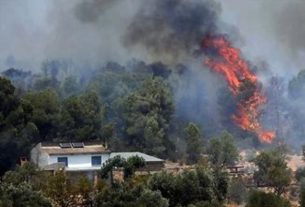KYIV — On the 1,000th day of Russia’s invasion, Ukraine vowed to never surrender, as Moscow continued its brutal offensive with airstrikes and escalated its nuclear threats. The grim anniversary was marked by a deadly Russian missile strike in the eastern Ukrainian region of Sumy, which obliterated a Soviet-era dormitory, killing at least nine people, including a child.
Ukrainian President Volodymyr Zelensky condemned the attack, sharing heartbreaking images of rescue teams pulling victims from the rubble. He urged Ukraine’s international allies to “force” Russia into peace talks and ramp up military aid to ensure a “sustainable” resolution to the war. In a statement marking the anniversary, Ukraine’s foreign ministry declared, “Ukraine will never submit to the occupiers, and the Russian military will be held accountable for its violations of international law.”
While Ukraine reaffirmed its commitment to resist, Russia also doubled down on its threats. Kremlin spokesperson Dmitry Peskov said that Moscow’s military campaign against Ukraine would continue until “completion,” despite international calls for peace negotiations. Russia’s rhetoric also grew more ominous as President Vladimir Putin signed a new decree broadening the circumstances under which Russia might use nuclear weapons. The new policy includes the possibility of nuclear retaliation in response to what it considers a joint attack by a non-nuclear state and a nuclear state, notably with the West’s involvement.
This revision of Russia’s nuclear doctrine comes after a series of high-profile threats by Putin during the nearly three-year conflict. Kremlin officials described the nuclear posture as a defensive deterrent, insisting that Russia would only use nuclear weapons if directly provoked or attacked, including by massive airstrikes, even if only conventional weapons are used.
In response to the new nuclear doctrine, Ukraine’s foreign ministry condemned Russia’s escalatory rhetoric, calling it “reckless” and warning that the Kremlin’s increasingly belligerent stance threatens global security. The United States recently gave Ukraine permission to use long-range missiles to strike deep into Russian territory, a move which has fueled tensions further.
The anniversary also saw continued heavy fighting on the frontlines, with Ukrainian forces struggling to defend against Russian advances, particularly in the regions of Kupiansk and Pokrovsk. Ukrainian forces face a growing Russian presence, including reports of North Korean military support for Moscow’s campaign. Ukrainian military officials have raised alarms about the use of banned chemical weapons by Russian forces, citing recent findings from the Organization for the Prohibition of Chemical Weapons (OPCW) that identified riot control gas in Ukrainian soil samples taken from the front lines.
The escalation comes after a series of deadly Russian airstrikes. In addition to the strike in Sumy, another missile attack on the port city of Odesa killed at least 10 people and injured 55. Ukrainian officials say they are increasingly concerned that Russia is deploying banned chemical agents to advance its military objectives.
As Russia’s war on Ukraine enters its third year, both sides remain entrenched, with no clear end in sight. Ukraine continues to resist, with the resolve of its military and civilians unwavering, while Russia pursues its objectives, backed by nuclear threats and continued violence. The international community remains deeply divided over how best to end the conflict, with Ukraine’s allies under pressure to provide more substantial military support, while the West grapples with the consequences of further escalating tensions with Moscow.





